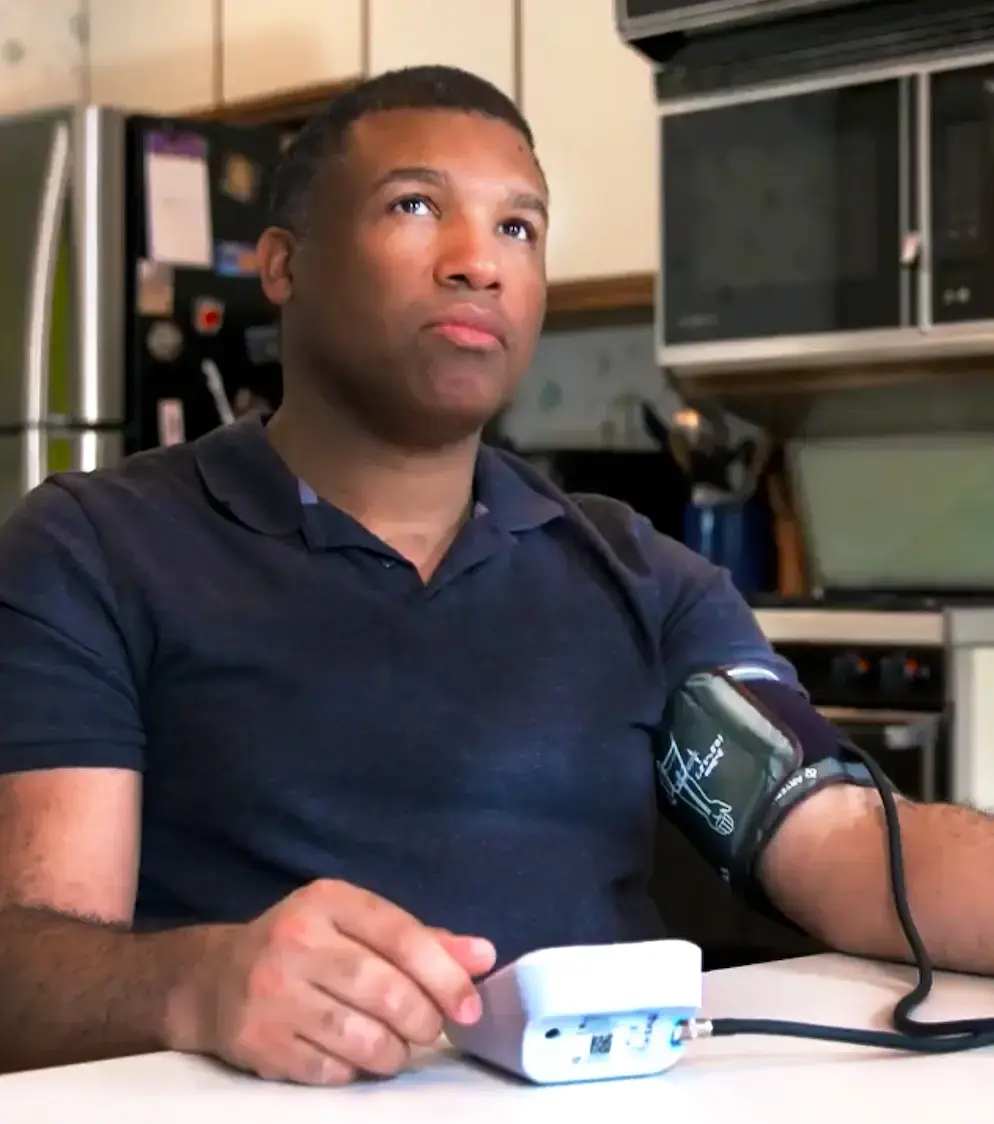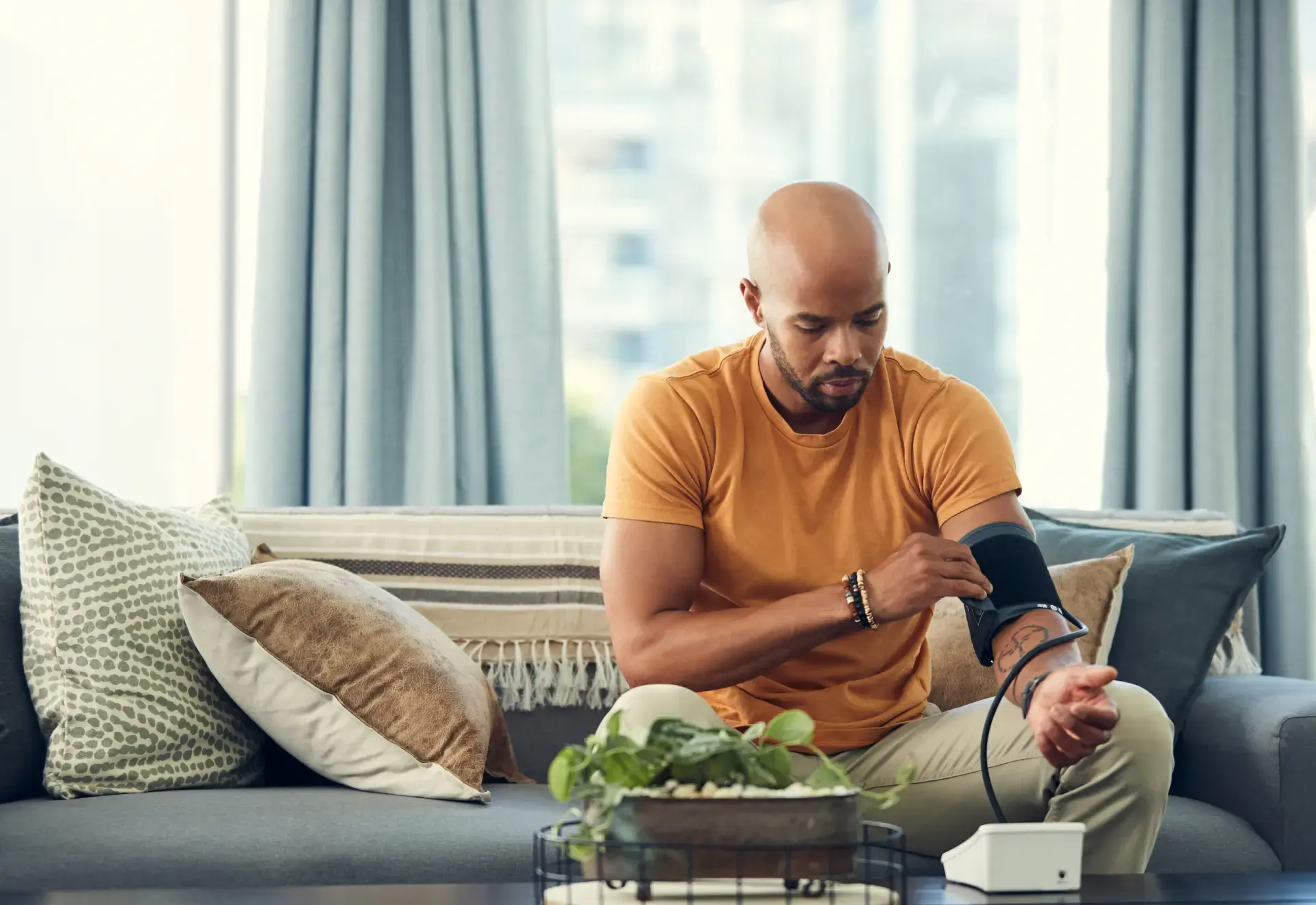Control Your Blood Pressure
High blood pressure — also called hypertension — affects a lot more than just your heart. It can impact your whole body, head to toe. But there are lots of things you can do to keep it under control, which means keeping your pressure consistently lower than 130/80.

Healthier blood pressure, healthier… everything!
In addition to lowering your risk for heart attack and stroke, keeping your blood pressure in a healthy range can really affect your quality of life. It can help:
- Lower your risk of memory loss and dementia. Did you know that lowering your blood pressure can protect your brain? Yep, keeping your blood pressure under control can reduce your risk of dementia by 15%.
- Keep your vision sharp. High blood pressure can damage the blood vessels in your eyes, which can cause blurry vision — or even vision loss.
- Protect your kidneys. Hypertension can slowly damage the kidneys and how they work over time.
- Maintain your sex life. It’s true! All parts of your body need healthy blood flow to work like they’re supposed to. High blood pressure can make it hard for men to keep an erection — and it can affect sex drive for both men and women.
Sounds pretty good, right? Well, there’s more — you can start making small changes right now to keep your blood pressure under control. You’ve got options for how to get started, so take your pick. Remember, it’s your heart health, your way.
Blood Pressure Facts
Blood pressure measures how hard your blood pushes against your arteries as it moves from your heart to your other organs.
High blood pressure can make your arteries more likely to burst or clog, which can lead to heart disease or stroke.
Every moment your blood pressure is out of control, it’s doing serious harm to your body in ways you can’t see.
Getting your blood pressure checked is the only way to know if it’s high.

How can I start controlling my blood pressure?
There are lots of things you can do to help keep your blood pressure consistently lower than 130/80. And the best part is that lots of those things can also improve your health in other ways. Here are some things that should be part of your control plan:
- Get your blood pressure checked, and do your best to keep track of your numbers — you can even get your own blood pressure cuff to check it at home.
- Cut back on sodium (salt) to help control your blood pressure — try cooking more at home and learning what to watch out for when choosing packaged foods.
- Get active to help keep your blood pressure in a healthy range — even 5 minutes a day can make a real difference to your health!
- If a doctor has prescribed medicine to help control your high blood pressure, follow all instructions for taking them. Most people with hypertension need to take medicine to keep it under control.
Get your blood pressure checked
Did you know that about 1 in 3 adults in the United States with high blood pressure don’t know they have it? That’s because most people with high blood pressure don’t have any signs or symptoms — meaning you could be at higher risk for a heart attack or stroke but feel completely fine. The only way to know if your blood pressure is high is to get it checked.
Where can I get my blood pressure checked?
- At your local pharmacy — you can get your blood pressure checked at any pharmacy
- At a doctor’s office — a health care professional can check your blood pressure the next time you go in
- At home — ask a health care professional how you can check your blood pressure with a cuff at home
How often do I need to get my blood pressure checked?
That depends. A good rule of thumb is to get your blood pressure checked once a year starting at age 18. But if you have high blood pressure — or you’re at risk for high blood pressure — you may need to get it checked more often. Ask a health care professional what’s right for you.
What’s a normal blood pressure reading?
A blood pressure reading of 120/80 or under is considered normal. Note there are always 2 numbers in a blood pressure reading:
- The first number (called systolic blood pressure) is the pressure in your arteries when your heart’s beating
- The second number (called diastolic blood pressure) is the pressure in your arteries when your heart’s resting between beats
That means a normal reading would mean your systolic is 120 or under and your diastolic is 80 or under.
Can I check my blood pressure at home?
Yes! In fact, it might be an important part of your daily routine if you have high blood pressure. Keep in mind, blood pressure can change based on things like activity, stress, caffeine, and even your posture. That’s why it’s important to measure and record your blood pressure regularly, not just at doctor visits. Ask a health care professional if you should be checking your blood pressure at home. If so, look for a cuff that goes around your upper arm (not your wrist or finger). Bring it to your next appointment so the doctor can see how it fits.
Cut back on sodium
When you eat too much sodium (salt), your body pulls more water into your bloodstream and your blood pressure goes up. Cutting back on sodium is a great way to help keep your blood pressure under control.
To be clear, you don’t have to try to ditch sodium entirely — that would be both impossible and actually bad for your health! But there are simple steps you can take to get less, and that’s a big win for your blood pressure. Learn how to eat right for your heart.
Get active for your heart
Physical activity strengthens your heart — and a stronger heart pumps more blood with less effort, which lowers your blood pressure. So find your beat and get your heart pumping with some physical activity — even for just 5 minutes! Physical activity can go a long way toward keeping your heart healthy.
To get the most health benefits, experts recommend 2 hours and 30 minutes of aerobic activity (like fast walking) every week. Do what you can at first — then you can try to work up to more over time. Learn how to get active for your heart.
Consider medicine to control hypertension
Sometimes, heart-healthy changes like getting active and cutting back on sodium just aren’t enough to do the trick. Why? Great question! And the truth is that experts just aren’t sure. It could be because high blood pressure runs in your family, or it could be something else altogether.
Whatever the cause, if a doctor recommends that you take medicine to help control your blood pressure, that’s not a reflection on your efforts. In fact, taking blood pressure medicine each day is a powerful way to improve your heart health — and prevent bigger problems down the road. Everyone’s path to blood pressure control is a little different, but most people manage their blood pressure through a mix of taking 1 or more blood pressure medicines along with healthy habits, like eating a low-salt diet, staying active, quitting smoking, and managing stress.
I’m nervous about taking medicine for my blood pressure. Do I have to?
The decision to take medicine is yours to make with help and support from a health care professional. And let’s be honest — there are some not-so-great things about taking medicine for high blood pressure. For example:
- It could take a while to find the right medicine — or combination of medicines
- Like any medicine, blood pressure medicines can have side effects
- You might have to take medicine for a long time
There’s no doubt these things can be a pain — but ask yourself this: Are they worth it to lower my risk for heart attack and stroke? For many people, the answer to that question is yes. Taking medicine to control your blood pressure can help reduce your risk of a heart attack and stroke — and help you feel your best, too.
And while we’re talking about questions…
Be sure to ask the doctor anything that comes up about medicines — or anything else! It’s their job to listen to you, give you the best information available, and make sure you understand that information. If something isn’t making sense the first time, ask the doctor to explain it again — you deserve clear answers.
Take Action
High Blood Pressure Get the facts you need about high blood pressure.
Facts About High Blood Pressure Take your learning a step further with these facts.
Know Your Numbers Understanding your blood pressure reading will help you understand next steps for addressing you heart health.
Cut Down on Sodium Start using these tips today to cut back on sodium in your diet.
Find a Health Center If you don’t have insurance, use this tool to find a health center where you may be able to get free or low-cost blood pressure checks.
U.S. Blood Pressure Device Validation If you have a blood pressure cuff at home, use this site to make sure it’s validated for use.